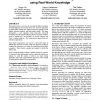Free Online Productivity Tools
i2Speak
i2Symbol
i2OCR
iTex2Img
iWeb2Print
iWeb2Shot
i2Type
iPdf2Split
iPdf2Merge
i2Bopomofo
i2Arabic
i2Style
i2Image
i2PDF
iLatex2Rtf
Sci2ools
120
click to vote
IUI
2003
ACM
2003
ACM
A model of textual affect sensing using real-world knowledge
This paper presents a novel way for assessing the affective qualities of natural language and a scenario for its use. Previous approaches to textual affect sensing have employed keyword spotting, lexical affinity, statistical methods, and hand-crafted models. This paper demonstrates a new approach, using large-scale real-world knowledge about the inherent affective nature of everyday situations (such as “getting into a car accident”) to classify sentences into “basic” emotion categories. This commonsense approach has new robustness implications. Open Mind Commonsense was used as a real world corpus of 400,000 facts about the everyday world. Four linguistic models are combined for robustness as a society of commonsense-based affect recognition. These models cooperate and compete to classify the affect of text. Such a system that analyzes affective qualities sentence by sentence is of practical value when people want to evaluate the text they are writing. As such, the system is ...
Related Content
| Added | 05 Jul 2010 |
| Updated | 05 Jul 2010 |
| Type | Conference |
| Year | 2003 |
| Where | IUI |
| Authors | Hugo Liu, Henry Lieberman, Ted Selker |
Comments (0)

